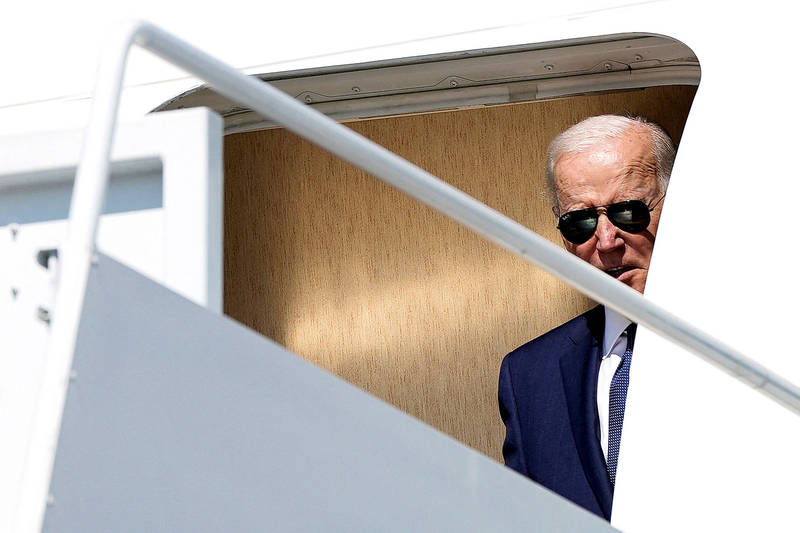《TAIPEI TIMES》US export rules target China’s chip industry

US President Joe Biden arrives at Hagerstown Regional Airport in Hagerstown, Maryland, on Friday. Photo: Reuters
NEW HARD LINE: The rules, which harken back to tough regulations of the Cold War era, would set China ‘back years,’ but Beijing would not give up, an analyst said
Reuters
The administration of US President Joe Biden on Friday published a sweeping set of export controls, including a measure to cut China off from certain semiconductor chips made anywhere in the world with US equipment, vastly expanding its reach in its bid to slow Beijing’s technological and military advances.
The rules, some of which take effect immediately, build on restrictions sent in letters this year to top toolmakers KLA Corp, Lam Research Corp and Applied Materials Inc, effectively requiring them to halt shipments of equipment to wholly Chinese-owned factories producing advanced logic chips.
The raft of measures could amount to the biggest shift in US policy toward shipping technology to China since the 1990s. If effective, they could hobble China’s chip manufacturing industry by forcing US and foreign companies that use US technology to cut off support for some of China’s leading factories and chip designers.
“This will set the Chinese back years,” said Jim Lewis, a technology and cybersecurity expert at the Center for Strategic and International Studies, a Washington-based think tank, adding that the policies harken back to the tough regulations at the height of the Cold War.
“China isn’t going to give up on chipmaking ... but this will really slow them” down, he said.
In a briefing with reporters on Thursday previewing the rules, senior government officials said that many of the measures were aimed at preventing foreign firms from selling advanced chips to China or supplying Chinese firms with tools to make their own advanced chips.
The rules also block shipments of a broad array of chips for use in Chinese supercomputing systems. The rules define a supercomputer as any system with more than 100 petaflops of computing power within a floor space of 595m2, a definition that two industry sources said could also hit some commercial data centers at Chinese tech giants.
In Taipei, the Ministry of Economic Affairs yesterday said that Taiwanese firms were law-abiding.
“Taiwan’s semiconductor industry has long served global customers and attaches great importance to compliance with laws,” it said. “In addition to complying with domestic laws and regulations, it will also cooperate with the needs of international customers who place orders and the norms of customers in their countries.”
Taiwan’s semiconductor industry is a technological leader and continues to “maintain an advantage in the competition for international orders,” it added.
The government continues to maintain close contact with manufacturers and supports them in investing in factory expansion and supplying products to the world for technological development, it said.
Taiwan Semiconductor Manufacturing Co (TSMC, 台積電), the world’s largest contract chipmaker and a major supplier to companies including Apple Inc, and smaller competitor United Microelectronics Corp (聯電) declined to comment on the US rules.
Eric Sayers, a defense policy expert at the American Enterprise Institute, said the move reflects a new bid by the Biden administration to contain China’s advances instead of simply seeking to level the playing field.
“The scope of the rule and potential impacts are quite stunning, but the devil will of course be in the details of implementation,” he added.
Earlier on Friday, the US added China’s top memory chipmaker Yangtze Memory Technologies Co (長江存儲) and 30 other Chinese entities to a list of companies that US officials cannot inspect, ratcheting up tensions with Beijing and starting a 60 day-clock that could trigger much tougher penalties.
Companies are added to the unverified list when US authorities cannot complete on-site visits to determine if they can be trusted to receive sensitive US technology, forcing US suppliers to take greater care when shipping to them.
新聞來源:TAIPEI TIMES















